-2024届高三英语二轮复习Future tenses 将来时课件(共28张PPT)
文档属性
| 名称 | -2024届高三英语二轮复习Future tenses 将来时课件(共28张PPT) |
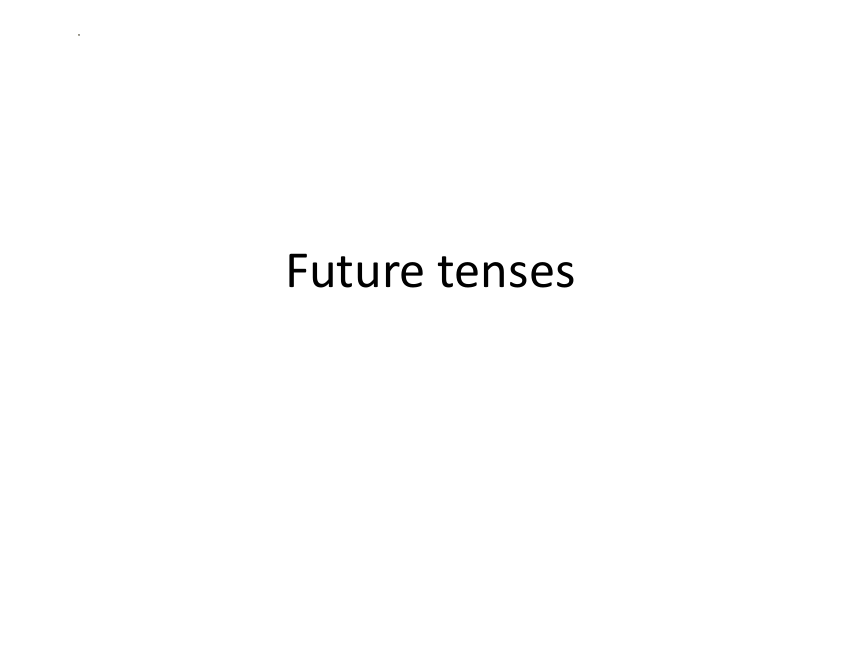
|
|
| 格式 | pptx | ||
| 文件大小 | 98.0KB | ||
| 资源类型 | 教案 | ||
| 版本资源 | 通用版 | ||
| 科目 | 英语 | ||
| 更新时间 | 2024-04-24 00:00:00 | ||
图片预览

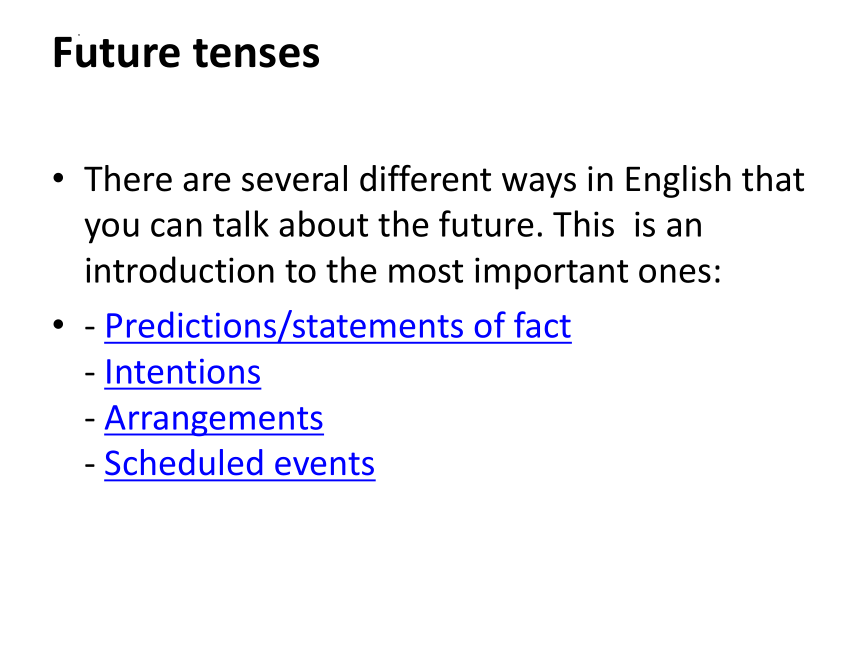

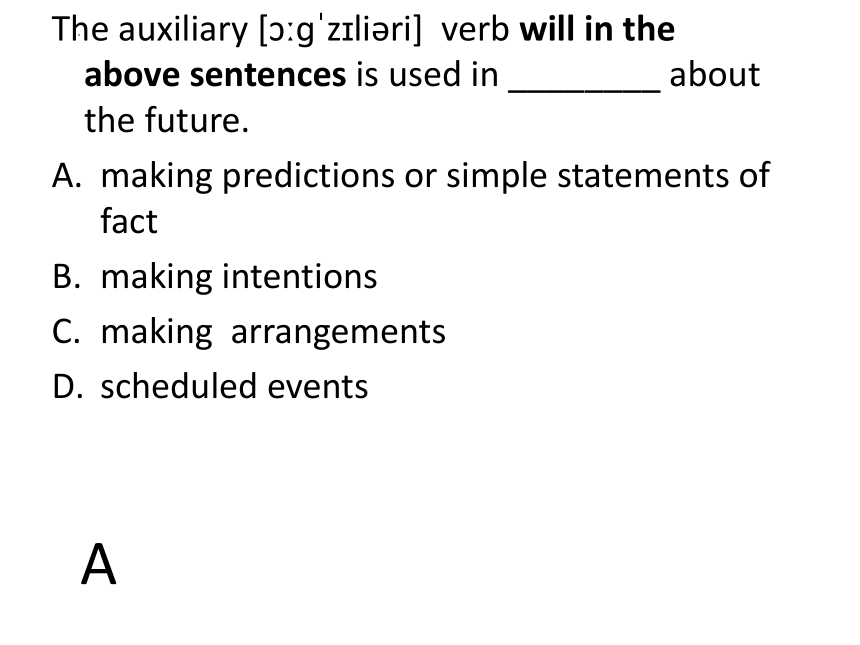
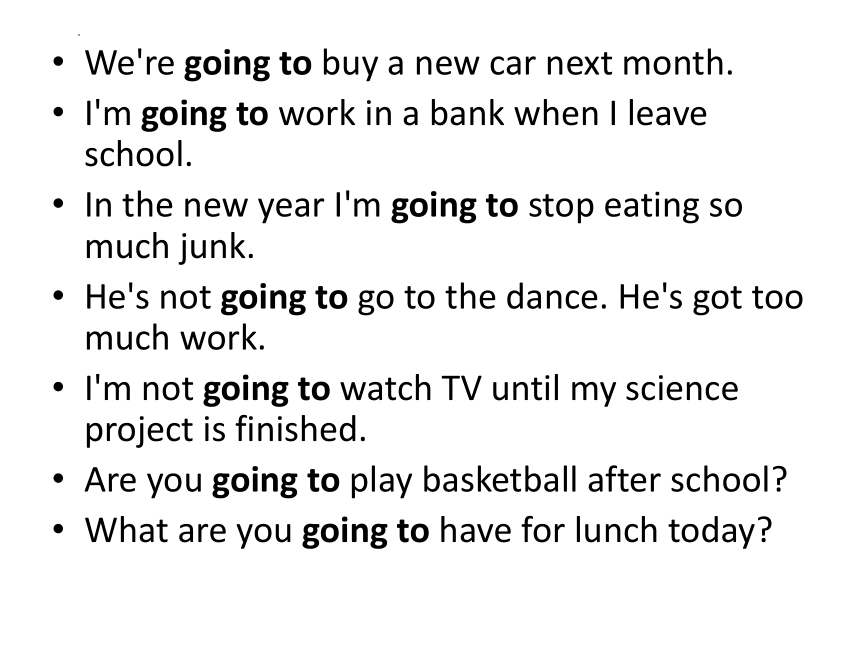
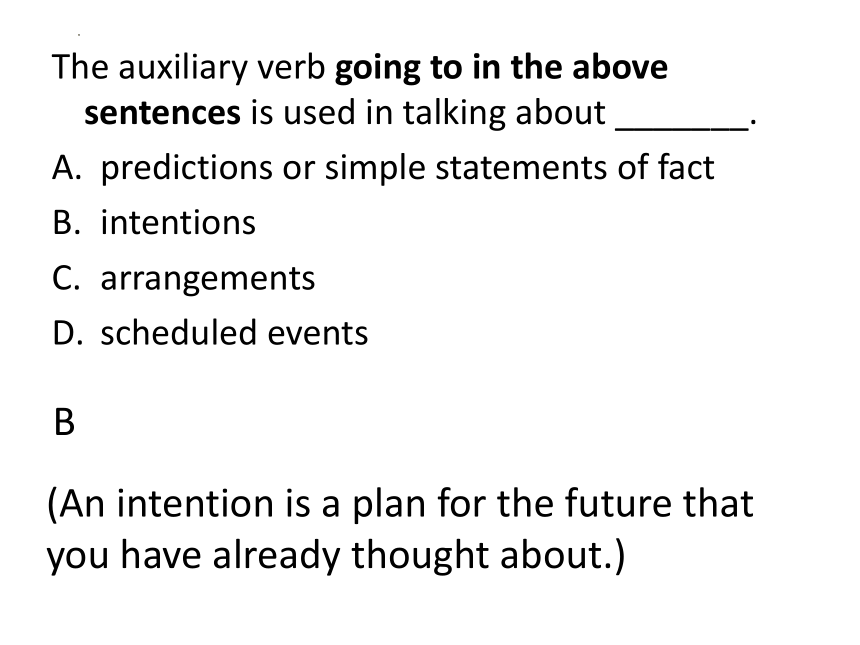
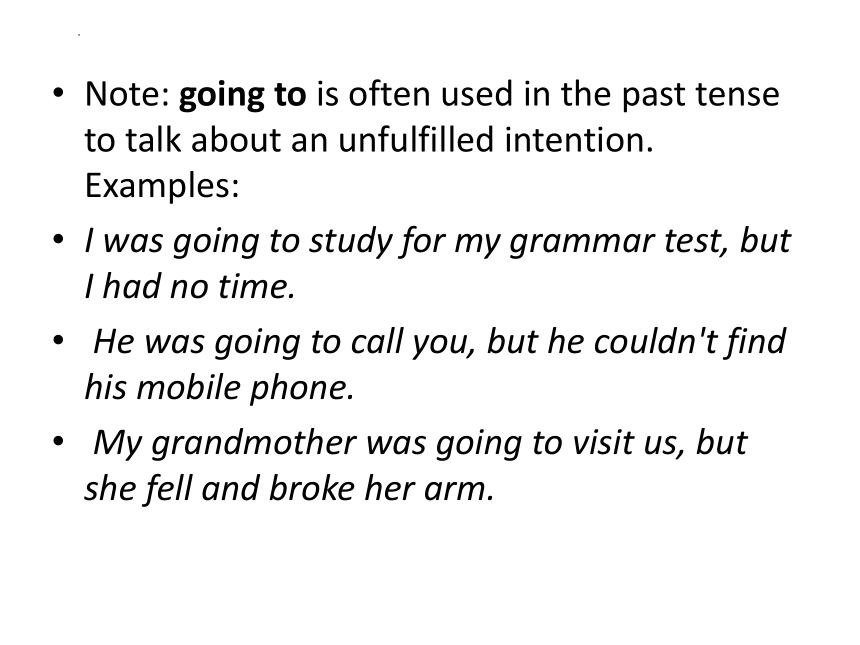
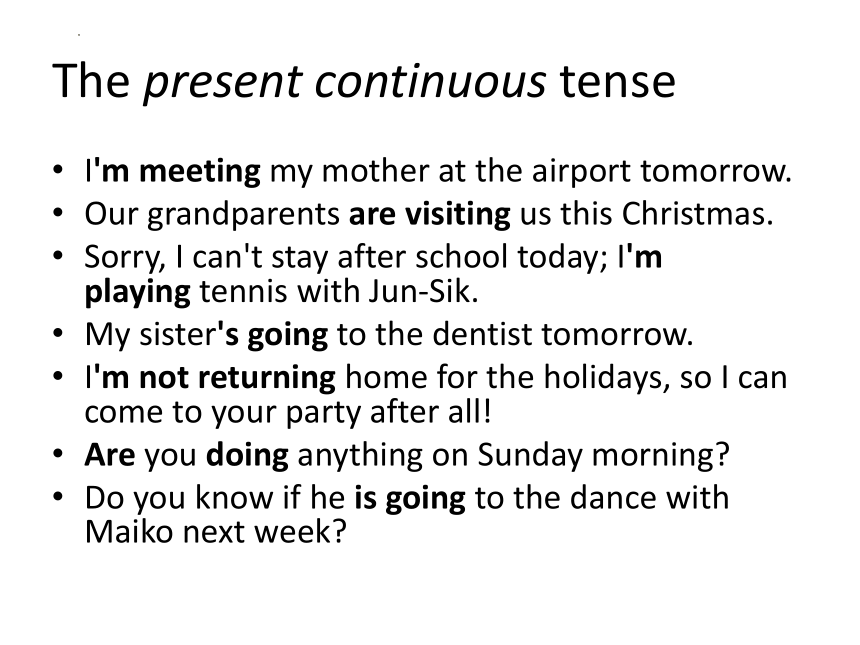

文档简介
(共28张PPT)
Future tenses
Future tenses
There are several different ways in English that you can talk about the future. This is an introduction to the most important ones:
- Predictions/statements of fact
- Intentions
- Arrangements
- Scheduled events
The sun will rise at 6.30 tomorrow.
Lunch break today will be 10 minutes longer than usual.
In the year 2050 all students will have their own computers in school.
If you help me, I will help you.
Do you think she will come soon
You won't pass your exams if you don't start working harder.
I know my parents won't let me go to the party.
Will it snow for Christmas
I know she's sick, but will she be back in school tomorrow
The auxiliary [ ɡ z li ri] verb will in the above sentences is used in ________ about the future.
making predictions or simple statements of fact
making intentions
making arrangements
scheduled events
A
We're going to buy a new car next month.
I'm going to work in a bank when I leave school.
In the new year I'm going to stop eating so much junk.
He's not going to go to the dance. He's got too much work.
I'm not going to watch TV until my science project is finished.
Are you going to play basketball after school
What are you going to have for lunch today
The auxiliary verb going to in the above sentences is used in talking about _______.
predictions or simple statements of fact
intentions
arrangements
scheduled events
B
(An intention is a plan for the future that you have already thought about.)
Note: going to is often used in the past tense to talk about an unfulfilled intention. Examples:
I was going to study for my grammar test, but I had no time.
He was going to call you, but he couldn't find his mobile phone.
My grandmother was going to visit us, but she fell and broke her arm.
The present continuous tense
I'm meeting my mother at the airport tomorrow.
Our grandparents are visiting us this Christmas.
Sorry, I can't stay after school today; I'm playing tennis with Jun-Sik.
My sister's going to the dentist tomorrow.
I'm not returning home for the holidays, so I can come to your party after all!
Are you doing anything on Sunday morning
Do you know if he is going to the dance with Maiko next week
(An arrangement is a plan for the future that you have already thought about and discussed with someone else.)
(An intention is a plan for the future that you have already thought about.)
The present continuous tense is used in talking about ________.
predictions or simple statements of fact
intentions
arrangements
scheduled events
C
The present simple tense
Hurry up! The train departs in 10 minutes.
I leave Frankfurt at 5 o'clock in the morning and arrive in New York at midnight the next day.
She has an appointment with the headmaster after school today.
There's no need to hurry. The train doesn't leave for another 30 minutes.
When does the meeting begin
The present simple tense is usually used to refer to future events that are scheduled (and outside of our control).
A.-Let’s go swimming after school.
- Sorry, I’m playing basketball with Sally and Miko.
B.-Let’s go swimming after school.
- Sorry, I’ll play basketball with Sally and Miko.
Look at the pairs of sentences below. Choose the sentence containing the correct future tense form (will / present continuous) for the given situation.
A
A. Do you think it ’s snowing tomorrow
B. Do you think it will snow tomorrow
B
A. If he doesn’t drive more carefully, he’s having an accident.
B. If he doesn’t drive more carefully, he’ll have an accident.
B
A.-What is the answer to question 3
Ask Miko. She’s knowing.
B.-What is the answer to question 3
- Ask Miko. She’ll know.
A.I think I’m buying a new computer. This one is too slow.
B.I think I’ll buy a new computer. This one is too slow.
B
B
A.I am not working tomorrow. We can go shopping if you like.
B.I will not work tomorrow. We can go shopping if you like.
A.I’m having my hair cut tomorrow so I won’t be able to go home with you.
B.I’ll have my hair cut tomorrow so I won’t be able to go home with you.
A
A
A.Have you got any plans for the vacation - Yes, we’re flying back to Japan to visit my grandmother.
B. Have you got any plans for the vacation - Yes, we’ll fly back to Japan to visit my grandmother.
A
A.I’m helping Miko after school today. She’s having problems in mathematics at the moment.
B.I’ll help Miko after school today. She’s having problems in mathematics at the moment.
A.I am selling my old car. My neighbour wants it for her daughter.
B.I will sell my old car. My neighbour wants it for her daughter.
A
A
A.My sister is getting married next month. We have invited hundreds of guests.
B.My sister will get married next month. We have invited hundreds of guests.
A
A.-How are you getting home today
- I think I’m walking for a change.
B.-How are you getting home today
- I think I’ll walk for a change.
B
Miko is giving a party next week.
- Has she invited you
B. Miko will give a party next week.
- Has she invited you
A
A.Are you doing anything after school today
B.Will you do anything after school today
A
A. The phone is ringing. - I’m answering it.
B. The phone is ringing. - I’ll answer it.
B
A. I’m driving John to the airport tomorrow. His own car is being repaired.
B. I’ll drive John to the airport tomorrow. His own car is being repaired.
A
A. We’re being there at 7.30. Don’t forget to bring the tickets.
B. We’ll be there at 7.30. Don’t forget to bring the tickets.
B
A.I think I’m buying fish for dinner tonight. I haven’t had it for ages.
B.I think I’ll buy fish for dinner tonight. I haven’t had it for ages.
B
A. Can you help me in the garden tomorrow - Sure! I’m not doing anything.
B. Can you help me in the garden tomorrow - Sure! I won’t do anything.
A
A. Do you think he’s coming soon
B. Do you think he’ll come soon
B
structure(结构) function(功能)
will do predictions/
statements of fact
am/is/are going to do intentions
am/is/are doing arrangements
do/does scheduled events
More tenses
Below is a list of some of the less common tenses, followed in each case by examples. Note that the continuous tenses convey the idea of an event or state going on for a period of time
Future continuous
At this time next week I will be sitting in the plane on the way to New York.
Don't call me after 10 o'clock. I'll be sleeping.
If you want to see Miho tomorrow, you will have to go to the school. She will be taking a test all afternoon.
I won't be working on my car this weekend. My mother-in-law will be here.
Future perfect
I hope my mother will have finished cooking dinner by the time I get home.
You can come at 6 o'clock. I will have done my homework by then.
There's no point calling her at home. She will have left for work already.
On June 25 2020 they will have been married for 60 years.
Future perfect continuous
By the time I retire I will have been working here for 45 years!
If she reaches her 60th birthday, she will have been smoking for half a century!
Future tenses
Future tenses
There are several different ways in English that you can talk about the future. This is an introduction to the most important ones:
- Predictions/statements of fact
- Intentions
- Arrangements
- Scheduled events
The sun will rise at 6.30 tomorrow.
Lunch break today will be 10 minutes longer than usual.
In the year 2050 all students will have their own computers in school.
If you help me, I will help you.
Do you think she will come soon
You won't pass your exams if you don't start working harder.
I know my parents won't let me go to the party.
Will it snow for Christmas
I know she's sick, but will she be back in school tomorrow
The auxiliary [ ɡ z li ri] verb will in the above sentences is used in ________ about the future.
making predictions or simple statements of fact
making intentions
making arrangements
scheduled events
A
We're going to buy a new car next month.
I'm going to work in a bank when I leave school.
In the new year I'm going to stop eating so much junk.
He's not going to go to the dance. He's got too much work.
I'm not going to watch TV until my science project is finished.
Are you going to play basketball after school
What are you going to have for lunch today
The auxiliary verb going to in the above sentences is used in talking about _______.
predictions or simple statements of fact
intentions
arrangements
scheduled events
B
(An intention is a plan for the future that you have already thought about.)
Note: going to is often used in the past tense to talk about an unfulfilled intention. Examples:
I was going to study for my grammar test, but I had no time.
He was going to call you, but he couldn't find his mobile phone.
My grandmother was going to visit us, but she fell and broke her arm.
The present continuous tense
I'm meeting my mother at the airport tomorrow.
Our grandparents are visiting us this Christmas.
Sorry, I can't stay after school today; I'm playing tennis with Jun-Sik.
My sister's going to the dentist tomorrow.
I'm not returning home for the holidays, so I can come to your party after all!
Are you doing anything on Sunday morning
Do you know if he is going to the dance with Maiko next week
(An arrangement is a plan for the future that you have already thought about and discussed with someone else.)
(An intention is a plan for the future that you have already thought about.)
The present continuous tense is used in talking about ________.
predictions or simple statements of fact
intentions
arrangements
scheduled events
C
The present simple tense
Hurry up! The train departs in 10 minutes.
I leave Frankfurt at 5 o'clock in the morning and arrive in New York at midnight the next day.
She has an appointment with the headmaster after school today.
There's no need to hurry. The train doesn't leave for another 30 minutes.
When does the meeting begin
The present simple tense is usually used to refer to future events that are scheduled (and outside of our control).
A.-Let’s go swimming after school.
- Sorry, I’m playing basketball with Sally and Miko.
B.-Let’s go swimming after school.
- Sorry, I’ll play basketball with Sally and Miko.
Look at the pairs of sentences below. Choose the sentence containing the correct future tense form (will / present continuous) for the given situation.
A
A. Do you think it ’s snowing tomorrow
B. Do you think it will snow tomorrow
B
A. If he doesn’t drive more carefully, he’s having an accident.
B. If he doesn’t drive more carefully, he’ll have an accident.
B
A.-What is the answer to question 3
Ask Miko. She’s knowing.
B.-What is the answer to question 3
- Ask Miko. She’ll know.
A.I think I’m buying a new computer. This one is too slow.
B.I think I’ll buy a new computer. This one is too slow.
B
B
A.I am not working tomorrow. We can go shopping if you like.
B.I will not work tomorrow. We can go shopping if you like.
A.I’m having my hair cut tomorrow so I won’t be able to go home with you.
B.I’ll have my hair cut tomorrow so I won’t be able to go home with you.
A
A
A.Have you got any plans for the vacation - Yes, we’re flying back to Japan to visit my grandmother.
B. Have you got any plans for the vacation - Yes, we’ll fly back to Japan to visit my grandmother.
A
A.I’m helping Miko after school today. She’s having problems in mathematics at the moment.
B.I’ll help Miko after school today. She’s having problems in mathematics at the moment.
A.I am selling my old car. My neighbour wants it for her daughter.
B.I will sell my old car. My neighbour wants it for her daughter.
A
A
A.My sister is getting married next month. We have invited hundreds of guests.
B.My sister will get married next month. We have invited hundreds of guests.
A
A.-How are you getting home today
- I think I’m walking for a change.
B.-How are you getting home today
- I think I’ll walk for a change.
B
Miko is giving a party next week.
- Has she invited you
B. Miko will give a party next week.
- Has she invited you
A
A.Are you doing anything after school today
B.Will you do anything after school today
A
A. The phone is ringing. - I’m answering it.
B. The phone is ringing. - I’ll answer it.
B
A. I’m driving John to the airport tomorrow. His own car is being repaired.
B. I’ll drive John to the airport tomorrow. His own car is being repaired.
A
A. We’re being there at 7.30. Don’t forget to bring the tickets.
B. We’ll be there at 7.30. Don’t forget to bring the tickets.
B
A.I think I’m buying fish for dinner tonight. I haven’t had it for ages.
B.I think I’ll buy fish for dinner tonight. I haven’t had it for ages.
B
A. Can you help me in the garden tomorrow - Sure! I’m not doing anything.
B. Can you help me in the garden tomorrow - Sure! I won’t do anything.
A
A. Do you think he’s coming soon
B. Do you think he’ll come soon
B
structure(结构) function(功能)
will do predictions/
statements of fact
am/is/are going to do intentions
am/is/are doing arrangements
do/does scheduled events
More tenses
Below is a list of some of the less common tenses, followed in each case by examples. Note that the continuous tenses convey the idea of an event or state going on for a period of time
Future continuous
At this time next week I will be sitting in the plane on the way to New York.
Don't call me after 10 o'clock. I'll be sleeping.
If you want to see Miho tomorrow, you will have to go to the school. She will be taking a test all afternoon.
I won't be working on my car this weekend. My mother-in-law will be here.
Future perfect
I hope my mother will have finished cooking dinner by the time I get home.
You can come at 6 o'clock. I will have done my homework by then.
There's no point calling her at home. She will have left for work already.
On June 25 2020 they will have been married for 60 years.
Future perfect continuous
By the time I retire I will have been working here for 45 years!
If she reaches her 60th birthday, she will have been smoking for half a century!
